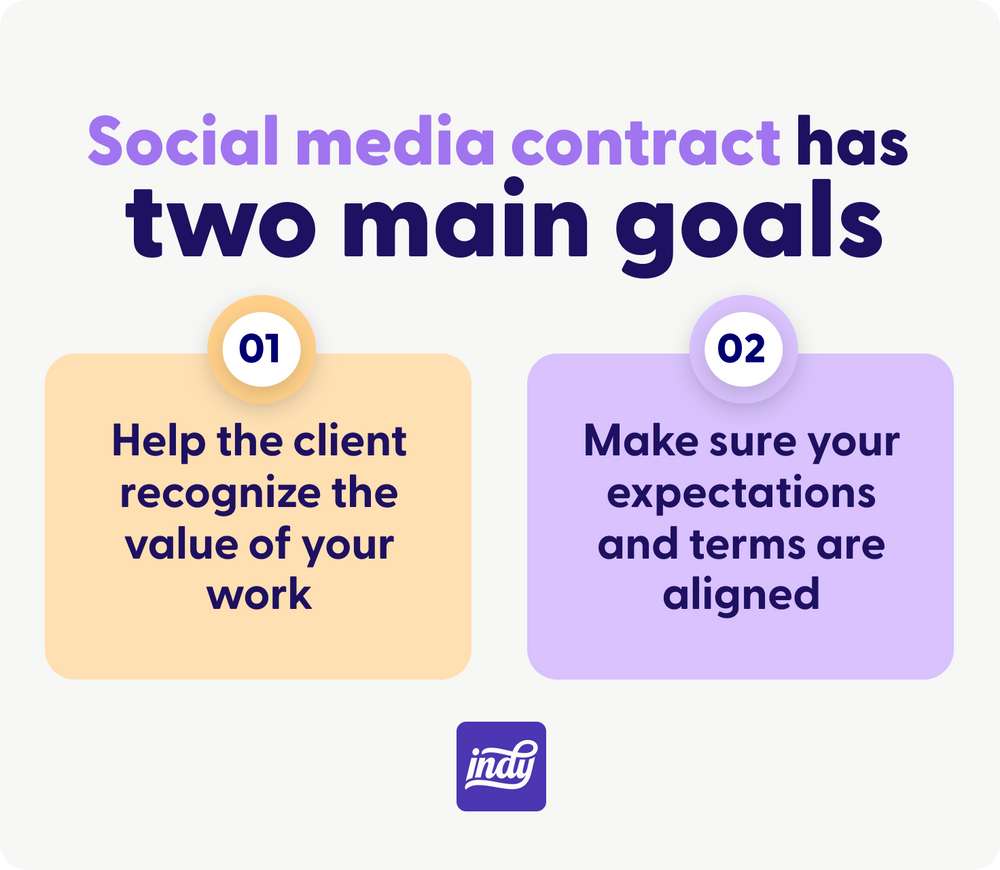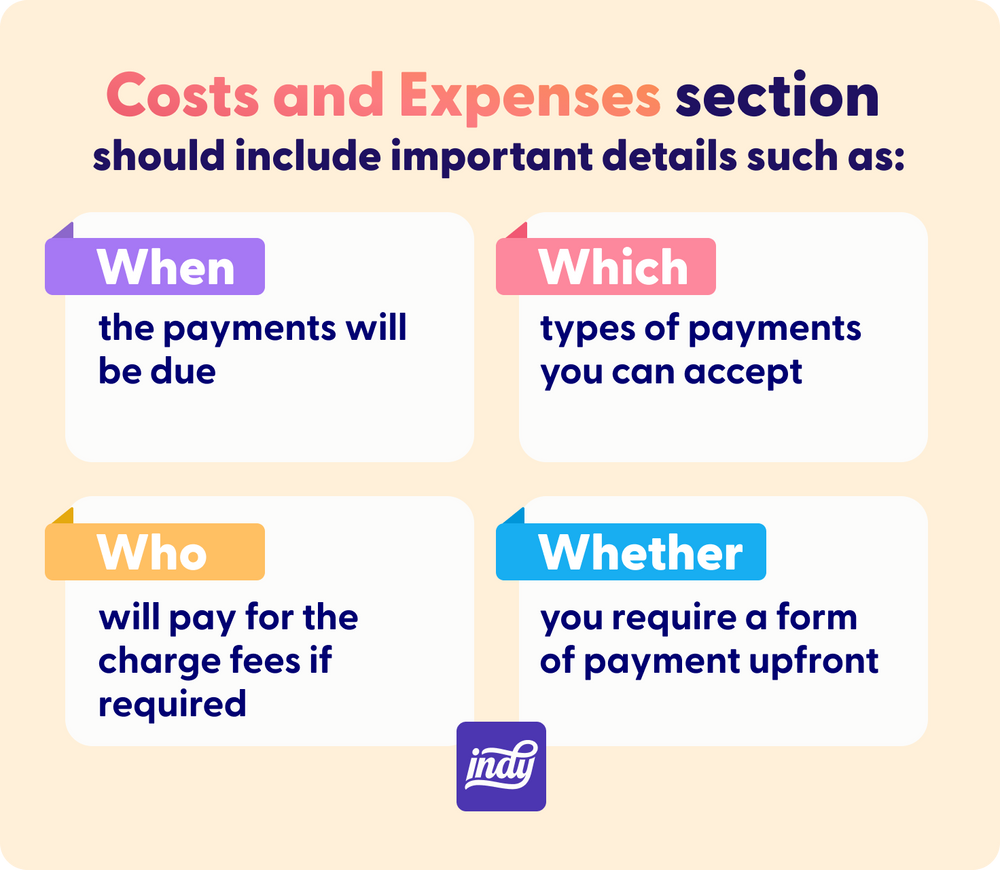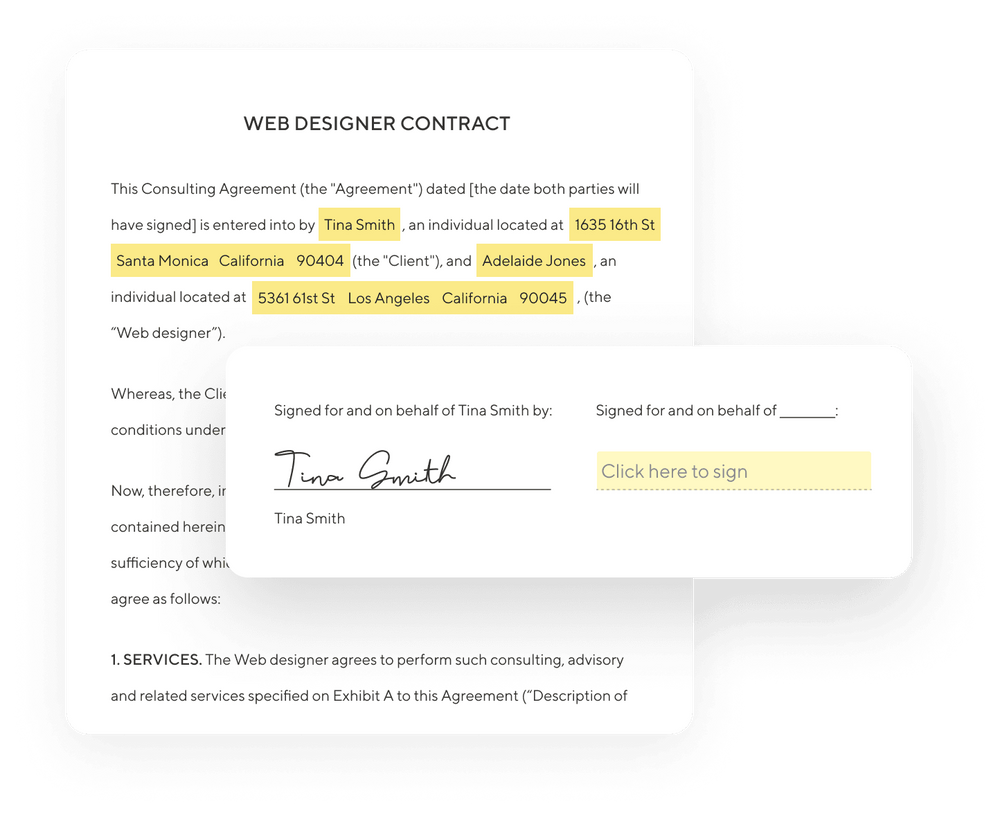Before beginning work for any client, businesses providing social media marketing services send contracts to review and sign. Many social media marketers and managers write their own social media contracts, while others use ready-made templates that cater to their specific needs.
Each relationship is different, so not all contracts you find online will apply to your case. Every arrangement involves several varied elements, all playing a specific role in ensuring a good relationship with your client. If you're a social media marketer, you will want to find a social media contract template that adapts to your specific needs.
But what makes a social media contract suitable, and should you be writing your own?
What Is a Social Media Contract?
A social media contract is a legally binding agreement that governs the relationship between two parties: A social media professional and a client.
Social media contracts are legal documents that typically cover the following points:
- The services you are going to provide as a consultant.
- The total costs and how each party will cover the expenses.
- The social media platforms you will use for your work.
- The details for all social media campaigns you will run.
- The time you will require to finish the work.
- Who owns the resulting outcome.
- The payment terms.
- How you will handle any confidential information.
- Any liabilities and steps for termination.
- Other relevant information including your relationship with independent contractors, integrated e-signatures, monthly fees, etc.
What's the Goal of a Social Media Contract?
Social media marketing has become an essential job, with freelance social media managers and marketers frequently representing a company across several channels as a brand's voice.
A social media contract has two main goals. The first is to help the client recognize the value of your work. The second is to make sure your expectations and terms are aligned.

The ultimate goal of a social media agreement is to protect both you and your client.
Parts of a Social Media Contract
As a social media marketer, there are several things you must have in your social media marketing agreement.
Let's go through them in detail.
The Parties and the Date
The first component of your social media agreement is to note the two parties. The parties typically include names, titles, and addresses. You can also simplify the rest of the contract by stating what other names you will use to refer to the people in the agreement. You should also include the date in this section.
For example:
"This social media management agreement (the "Agreement”) sets up the terms and conditions upon which [Client or Company name] (the "Company"), registered address [Address], enagages [Consultant name] (the "Consultant"), registered address [Address] as an advertiser for…”
The Work That Will Be Provided
Agreeing on the work that needs to be done is critical, so you should try to be as descriptive as possible in what social media management services you or your company will provide to the client.
Include all the responsibilities of a social media manager, and don't forget to mention the things for which the clients will be responsible. It's not enough to explain what you aim to achieve, such as connecting with an audience, establishing brand loyalty, or covering certain social media platforms. If you post content on different sites on behalf of a client, you should also mention the number of times you will post and on which social media platforms you will do it. You should also always include any secondary activities that will be part of your work.
It's helpful to enclose a list of resources and information you might need to launch and run social media marketing campaigns—mention who's responsible for delivering this information and when you should expect it. Be detailed about your responsibilities and cover things like whether or not you will also write or review copy, or you might need to request images, approvals, etc.
Don't forget to outline deadlines and estimates for meeting goals. It's always best to use dates and numbers when talking about milestones and timeframes.
For example:
The Company's main activity is [Describe the client's activities], whereas the Consultant will provide [Describe your activities].
All work is to be completed and reviewed by [Date].
The Consultant agrees to the following milestones: [List milestones].
Costs and Expenses

Make sure you think carefully about this next section. Any social media marketing contract should include exactly how much the work costs, as well as a few other important details such as:
- When the payments will be due.
- The different types of payments you can accept.
- Whether you will make payments at regular intervals.
- Who will pay for the charge fees if required.
- Whether you require a form of payment upfront.
Although we all expect our contracts to go smoothly, try to think of the worst-case scenarios, such as what would happen if the client makes a late payment or refuses to pay.
This section should also include any extra expenses required for traveling, buying specific software or stock imagery, and other things not covered by the initial quote.
It's also important to add provisions for reviews. If the client has to pay for these revisions, you should mention their cost. If not, you can include any other considerations like what happens if the client provides no feedback for a certain period of time.
For example:
The Company will be invoiced through an invoicing system weekly in the amount of $[Sum]...
Payment will be made within [Amount] days after receipt of the invoice. For past due invoices, a late fee of $[Sum] will apply...
If the Consultant shall not hear from the Company within seven days after submission of the work, the work shall be considered accepted with no further changes permitted...
Intellectual Property and Nonexclusivity
Your social media agreement contract should always include who owns the work you will create. Typically, the company retains its right, although you can include special provisions for proprietary methods and training materials.
Another thing to consider is whether you agree to an exclusive relationship between the parties or if you will be free to continue working for other clients.
For example:
All intellectual property of the work produced will become the intellectual property of the Company, as a work-made-for-hire...
Company and Consultant hereby agree that Consultant shall be free to continue working for and taking on new clients, without regard to the Company.
Confidentiality
You should always include a statement in your social media contract attesting that all information given to you by the client will remain confidential.
For example:
The Consultant will maintain the confidentiality of all the Company's information, including financial information, analytics, etc.
Timeline and Termination
Be sure to include whether the work is open-ended or month-to-month in your contract. Also, explain what would happen if either party were to end or cancel it. For example, you might require the client to give you a 30 day written notice before terminating the agreement. It would help if you also referred to the fees and reimbursements that the client might have to pay in the event of a termination.
For example:
The Parties might terminate this agreement before the specified end date by giving notice in writing [Number of days] days in advance...
This agreement may be terminated immediately in the event of a breach of the terms by either party...
Force Majeure
In the unlikely event that you might be unable to perform your duties due to causes beyond your control (such as acts of nature or other unforeseen circumstances), it can be helpful to include a "Force Majeure" clause.
For example:
The Consultant is not liable for any failure to perform due to causes beyond its reasonable control, such as natural disasters.
Other Factors
We recommend that your contract outlines a clause around access to a client's tools. This clause can include login information for analytics, tracking KPIs, and third-party software.
Date, Signature, and Page Numbers
Remember to leave a space at the bottom of your contract where you and your client can sign. It would be best if you also left an empty area for initials on each page.
If your contract has multiple pages, make sure you number them.
Summary
Many freelancers have chosen social media marketing as their preferred business. As a result, social media marketing contracts have become the norm, so your client should be happy to see you can provide one that fits both your needs.
In addition to management contracts, you should also consider creating other documents such as NDAs (Non-Disclosure Agreements) for when you are the one doing the hiring. As a social media manager, you can send new hires an independent contractor contract to help you cover your business from the get-go.
Indy is a single-stop freelancing platform that provides all the tools you need for your business in one place. You can create, send, and sign social media contracts in minutes with Indy. The platform offers an impressive selection of contract templates and provides an electronic signature feature. Create contracts in a flash and customize them flexibly to make a lasting impression with your social media clients.



